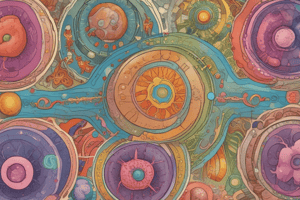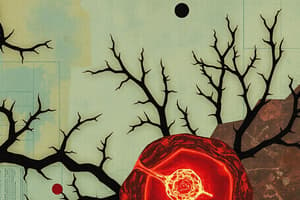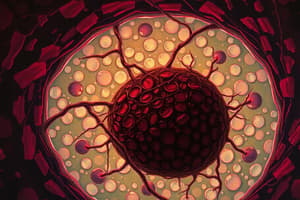Podcast
Questions and Answers
What characterizes cancer as a disease?
What characterizes cancer as a disease?
- Uniformity in cell function
- Presence of a protective capsule
- Uncontrolled growth and spread of abnormal cells (correct)
- Controlled growth of normal cells
What is the term used to describe new growth of tissue that serves no physiological function?
What is the term used to describe new growth of tissue that serves no physiological function?
- Tumor
- Biopsy
- Metastasis
- Neoplasm (correct)
Which type of cancer is characterized by cancerous cells in the blood-forming tissues?
Which type of cancer is characterized by cancerous cells in the blood-forming tissues?
- Leukaemia (correct)
- Sarcoma
- Carcinoma
- Adenoma
What process describes the ability of malignant tumors to spread to other organs?
What process describes the ability of malignant tumors to spread to other organs?
Which of the following types of cancer is typically a result of mutated epithelial cells?
Which of the following types of cancer is typically a result of mutated epithelial cells?
What term is used for the microscopic examination of cell development?
What term is used for the microscopic examination of cell development?
What type of cancer is characterized by a malignant tumor of connective tissue?
What type of cancer is characterized by a malignant tumor of connective tissue?
What stage of cancer is indicated when a tumor is classified as benign?
What stage of cancer is indicated when a tumor is classified as benign?
Which agent is associated with the highest estimated number of cancer cases worldwide in 2000?
Which agent is associated with the highest estimated number of cancer cases worldwide in 2000?
Which of the following infections is linked to non-Hodgkin lymphoma cases?
Which of the following infections is linked to non-Hodgkin lymphoma cases?
What percentage of worldwide cancer cases in 2000 was attributed to stomach cancer related to H.pylori?
What percentage of worldwide cancer cases in 2000 was attributed to stomach cancer related to H.pylori?
Which of the following agents is NOT listed as a chemical cause of cancer?
Which of the following agents is NOT listed as a chemical cause of cancer?
What lifestyle factor significantly contributes to obesity-related cancers?
What lifestyle factor significantly contributes to obesity-related cancers?
Which type of external cause is directly attributed to skin cancer?
Which type of external cause is directly attributed to skin cancer?
Which of the following factors can increase the risk of cancer due to occupational exposure?
Which of the following factors can increase the risk of cancer due to occupational exposure?
What percentage of lung cancers is attributed to smoking?
What percentage of lung cancers is attributed to smoking?
What percentage of cancers is believed to be hereditary?
What percentage of cancers is believed to be hereditary?
What is the primary external factor contributing to cancer deaths?
What is the primary external factor contributing to cancer deaths?
Which type of cancer is linked to the BRCA 1&2 genes?
Which type of cancer is linked to the BRCA 1&2 genes?
Which virus is associated with cervical cancer?
Which virus is associated with cervical cancer?
Which of these factors has been shown to decrease the risk of breast cancer?
Which of these factors has been shown to decrease the risk of breast cancer?
Which of the following cancers show familial patterns?
Which of the following cancers show familial patterns?
What role does the Helicobacter pylori bacteria play in cancer?
What role does the Helicobacter pylori bacteria play in cancer?
Which of the following lifestyle factors is NOT considered a risk for cancer?
Which of the following lifestyle factors is NOT considered a risk for cancer?
What is the lifetime risk concerning cancer?
What is the lifetime risk concerning cancer?
What intrinsic factor can influence cancer development in individuals?
What intrinsic factor can influence cancer development in individuals?
What is the primary function of the nephron in the kidney?
What is the primary function of the nephron in the kidney?
Which structure is located at the beginning of each nephron?
Which structure is located at the beginning of each nephron?
What type of epithelium forms the outer layer of Bowman's capsule?
What type of epithelium forms the outer layer of Bowman's capsule?
Which part of the kidney is responsible for draining urine into the bladder?
Which part of the kidney is responsible for draining urine into the bladder?
Which component of the juxtaglomerular apparatus is responsible for blood pressure regulation?
Which component of the juxtaglomerular apparatus is responsible for blood pressure regulation?
What are the small openings between the pedicles of podocytes called?
What are the small openings between the pedicles of podocytes called?
Which structure is NOT part of the kidney's internal anatomy?
Which structure is NOT part of the kidney's internal anatomy?
Which is the correct sequence of urine flow from the kidney to the outside environment?
Which is the correct sequence of urine flow from the kidney to the outside environment?
What is the primary epithelial type lining the proximal convoluted tubule?
What is the primary epithelial type lining the proximal convoluted tubule?
What are the three layers of the ureter wall, from inside to outside?
What are the three layers of the ureter wall, from inside to outside?
Which portion of the Loop of Henle transitions from thick to thin epithelium?
Which portion of the Loop of Henle transitions from thick to thin epithelium?
What is unique about the muscular coat of the ureter compared to the gastrointestinal tract?
What is unique about the muscular coat of the ureter compared to the gastrointestinal tract?
What type of cells does the bladder mucosa primarily consist of?
What type of cells does the bladder mucosa primarily consist of?
Which muscle layer in the ureter becomes more complex in the lower third?
Which muscle layer in the ureter becomes more complex in the lower third?
How does the urethra differ between males and females in terms of structure?
How does the urethra differ between males and females in terms of structure?
What is the function of the brush border in the proximal convoluted tubule?
What is the function of the brush border in the proximal convoluted tubule?
Which component of the juxtaglomerular apparatus is responsible for sensing changes in sodium concentration?
Which component of the juxtaglomerular apparatus is responsible for sensing changes in sodium concentration?
What is the primary function of the proximal convoluted tubule in the nephron?
What is the primary function of the proximal convoluted tubule in the nephron?
What type of epithelium lines the thin descending limb of the Loop of Henle?
What type of epithelium lines the thin descending limb of the Loop of Henle?
Which feature is characteristic of the distal convoluted tubule compared to the proximal convoluted tubule?
Which feature is characteristic of the distal convoluted tubule compared to the proximal convoluted tubule?
How does the juxtaglomerular apparatus contribute to blood pressure regulation?
How does the juxtaglomerular apparatus contribute to blood pressure regulation?
Which segment of the nephron is primarily responsible for urine concentration?
Which segment of the nephron is primarily responsible for urine concentration?
What is the significance of the collecting tubule in the nephron structure?
What is the significance of the collecting tubule in the nephron structure?
Which type of connective tissue is found surrounding the renal corpuscle?
Which type of connective tissue is found surrounding the renal corpuscle?
Flashcards
Cancer
Cancer
A group of diseases characterized by the uncontrolled growth and spread of abnormal cells.
Neoplasm
Neoplasm
A new tissue growth with no physiological function.
Tumor
Tumor
A clump of neoplasmic cells.
Malignant tumor
Malignant tumor
Signup and view all the flashcards
Benign tumor
Benign tumor
Signup and view all the flashcards
Biopsy
Biopsy
Signup and view all the flashcards
Metastasis
Metastasis
Signup and view all the flashcards
Mutant cells
Mutant cells
Signup and view all the flashcards
Carcinomas
Carcinomas
Signup and view all the flashcards
Sarcomas
Sarcomas
Signup and view all the flashcards
Lymphomas
Lymphomas
Signup and view all the flashcards
Leukemias
Leukemias
Signup and view all the flashcards
Adenomas
Adenomas
Signup and view all the flashcards
Carcinogens
Carcinogens
Signup and view all the flashcards
Oncogenes/Proto-oncogenes
Oncogenes/Proto-oncogenes
Signup and view all the flashcards
Lifetime risk
Lifetime risk
Signup and view all the flashcards
Relative risk
Relative risk
Signup and view all the flashcards
Smoking risks
Smoking risks
Signup and view all the flashcards
Obesity risks
Obesity risks
Signup and view all the flashcards
Heredity cancer risks
Heredity cancer risks
Signup and view all the flashcards
Biological Factors [cancer]
Biological Factors [cancer]
Signup and view all the flashcards
Immune Factors [cancer]
Immune Factors [cancer]
Signup and view all the flashcards
Proximal Convoluted Tubule
Proximal Convoluted Tubule
Signup and view all the flashcards
Loop of Henle
Loop of Henle
Signup and view all the flashcards
Distal Convoluted Tubule
Distal Convoluted Tubule
Signup and view all the flashcards
Ureter: Mucosa Layer
Ureter: Mucosa Layer
Signup and view all the flashcards
Ureter: Muscular Coat
Ureter: Muscular Coat
Signup and view all the flashcards
Ureter: Fibrosa Layer
Ureter: Fibrosa Layer
Signup and view all the flashcards
Bladder: Mucosa
Bladder: Mucosa
Signup and view all the flashcards
Bladder: Detrusor Muscle
Bladder: Detrusor Muscle
Signup and view all the flashcards
Kidney's main function
Kidney's main function
Signup and view all the flashcards
What are nephrons?
What are nephrons?
Signup and view all the flashcards
Renal corpuscle
Renal corpuscle
Signup and view all the flashcards
Glomerulus
Glomerulus
Signup and view all the flashcards
Bowman's capsule
Bowman's capsule
Signup and view all the flashcards
Podocytes
Podocytes
Signup and view all the flashcards
Filtration slits
Filtration slits
Signup and view all the flashcards
What is the cortex?
What is the cortex?
Signup and view all the flashcards
Juxtaglomerular Apparatus
Juxtaglomerular Apparatus
Signup and view all the flashcards
Macula Densa
Macula Densa
Signup and view all the flashcards
Extraglomerular Mesangial Cells
Extraglomerular Mesangial Cells
Signup and view all the flashcards
Juxtaglomerular Cells
Juxtaglomerular Cells
Signup and view all the flashcards
Collecting Tubule
Collecting Tubule
Signup and view all the flashcards
Study Notes
What Is Cancer?
- Cancer is a group of diseases marked by uncontrolled abnormal cell growth and spread
- Neoplasm is a new tissue growth with no physiological function
- Tumor is a clump of neoplasmic cells
- Malignant tumor is cancerous
- Benign tumor is noncancerous
- Biopsy is a microscopic examination of cell development
- Metastasis is the spread of malignant tumors that are not enclosed in a protective capsule to other organs
- Mutant cells are abnormal cells with disrupted RNA and DNA, causing changes in form, quality, and function
Types of Cancer
- Carcinomas are cancers of epithelial tissue
- Sarcomas are cancers of connective tissue
- Lymphomas are cancers of the lymphatic system
- Leukemias are cancers of blood-forming tissues
- Adenomas are tumors of glandular epithelial tissue
- Specific cell names often prefix the cancer type
What Causes Cancer?
- External Factors: Chemicals, radiation, viruses, and lifestyle
- Internal Factors: Hormones, immune conditions, and inherited mutations
- Cellular change/mutation theories propose that cancer arises from genetic changes
- Carcinogens are cancer-causing agents
- Oncogenes and protooncogenes are genes that can regulate cell growth and development, and mutations in these genes can contribute to cancer
Risks For Cancer
- Lifetime risk is the probability of developing or dying from cancer over a lifetime
- Relative risk measures how strongly risk factors are related to a specific cancer
- Smoking is linked to 30% of all cancer deaths and 87% of lung cancer deaths
- Obesity increases the risk of breast and colon cancer
Carcinogenesis
- Heredity plays a role in 5-10% of cancers, and potentially 15% of all cancers
- Genes like RB1, APC, HNPCC, BRCA1 & 2, and p53 have been linked to familial cancer syndromes
Biological Factors
- Breast, stomach, colon, prostate, uterus, ovary, and lung cancers can be familial
- Hodgkin’s disease and certain leukemias also show familial patterns
Immunity
- HIV/AIDS and immunosuppression increase cancer risk
Reproductive And Hormonal Risks
- Pregnancy and oral contraceptives can increase breast cancer risk
- Late menarche, early menopause, early childbirth, and having many children can reduce breast cancer risk
Virus’s
- Hepatitis B, human T-cell leukemia virus (HTLV), Epstein-Barr virus (EBV), and human papillomavirus (HPV) are associated with cancer
Viral Factors
- Herpes-related viruses may be involved in leukemia, Hodgkin’s disease, cervical cancer, and Burkitt’s lymphoma
- EBV, associated with mononucleosis, may contribute to cancer
- HPV, causing genital warts, is linked to cervical cancer
- Helicobacter pylori, causing ulcers, is a major factor in stomach cancer
Bacterial Factors
- H. pylori is linked to stomach cancer
- Parasites like Schistosoma spp. and Clonorchis sinensis can increase cancer risk
Chemical Causes
- Alcohol, asbestos, wood dust, rubber, plastics, dyes, tar, bitumen, aflatoxin, alkylating agents, and tobacco are known carcinogens
External causes of cancer: ultraviolet radiation
- Sunlight and certain industrial sources emit ultraviolet radiation, which can contribute to cancer
Physical Causes
- Ultraviolet radiation from sunlight and industrial sources can cause cancer
- Radiation exposure from radon and cancer treatment can also increase cancer risk
Lifestyle factors: diet
- High caloric diet, rich in fat, refined carbohydrates, and animal protein, combined with low physical activity, can increase cancer risk
Obesity
- Obesity increases the risk of cancer, diabetes, cardiovascular disease, and hypertension
Lifestyle
- Age, occupation, ethnicity, and deprivation can affect cancer risk
Studying That Suits You
Use AI to generate personalized quizzes and flashcards to suit your learning preferences.




